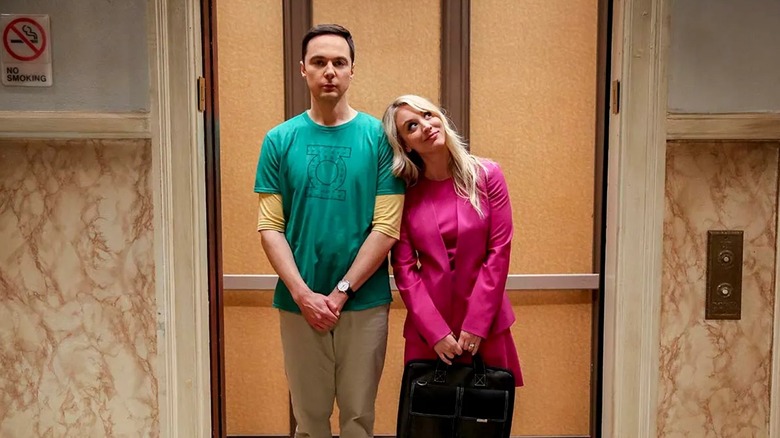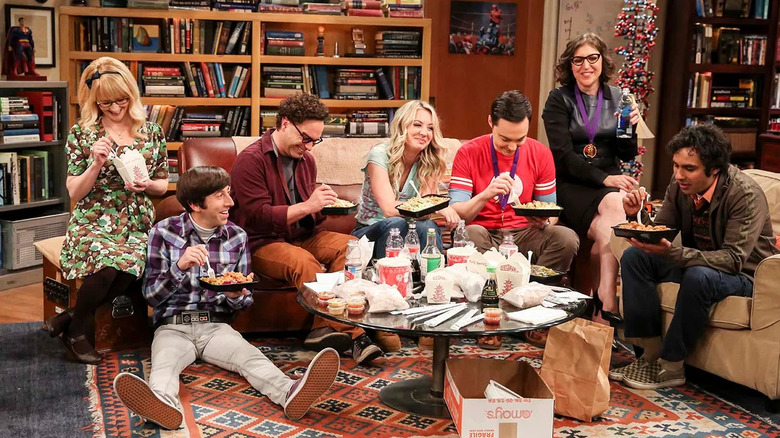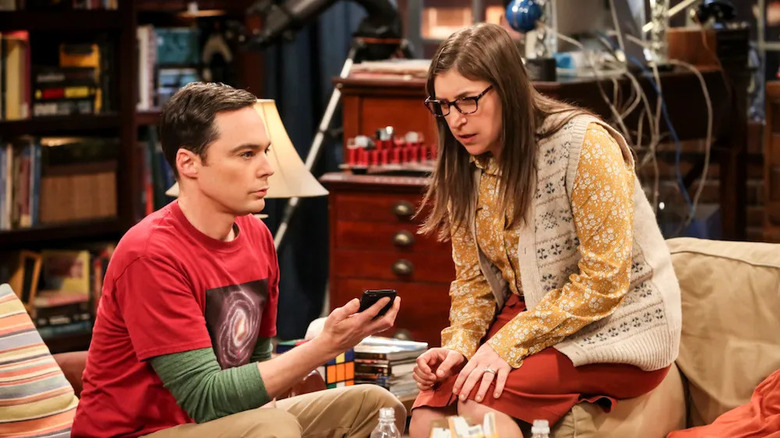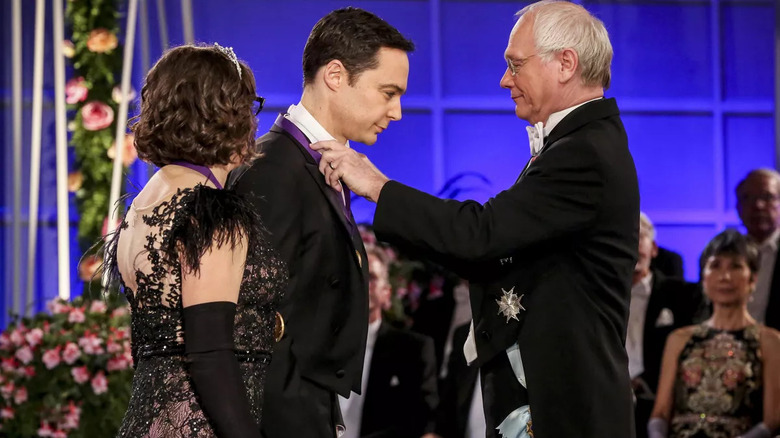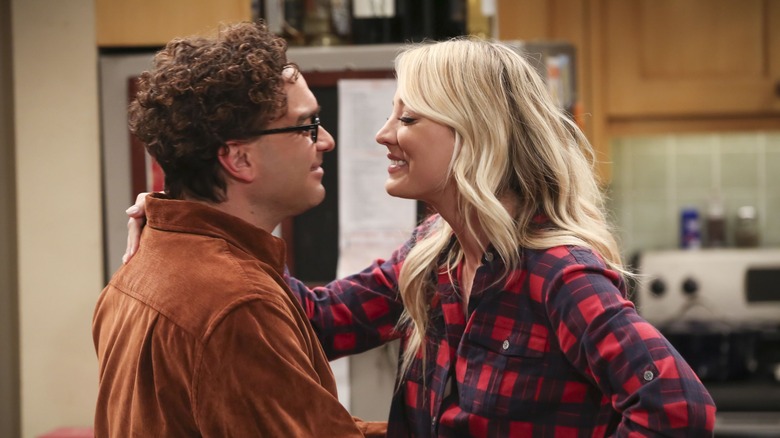The Big Bang Theory Ending Explained: What Happens In The Finale?
All good things must come to an end, and that includes "The Big Bang Theory." After kicking off its run in 2007, the show concluded in 2019 after winning veritable piles of Emmy Awards (including several for star Jim Parsons) and after a whopping twelve seasons on CBS. It's been a while since the series ended, so it's fair to ask: what happens in the finale, and what does it mean for the entirety of the show's story?
Wrapping up a long-running show is tough, and showrunner Chuck Lorre and his creative team had a tough path to chart after Parsons announced that season 12 would be his last as the enigmatic, quirky Sheldon Cooper — which meant that it would also be the last season of the show overall. Thankfully, they managed to figure out endings for all of their main characters — although some are definitely more satisfying than others — and bring the series to a pretty satisfying conclusion as Sheldon and his friends achieve long-held goals and plan their futures. Here's the ending of The Big Bang Theory explained, what that finale says about the entire series, and how the cast and crew felt about both the finale and the fact that the show ended in the first place.
What you need to remember about the plot of The Big Bang Theory
As a reminder, here's the basic deal with "The Big Bang Theory." At the beginning of the series, Sheldon Cooper and his roommate Leonard Hofstadter (Johnny Galecki) are surprised to learn that a beautiful young girl named Penny (Kaley Cuoco) is moving in across the hall from them; when they introduce her to their other friends Raj Koothrappali (Kunal Nayyar, who narrowly missed out on the role in the first place) and Howard Wolowitz (Simon Helberg), she's accepted into their little gang. Penny is essentially an audience surrogate for when the guys get a little too nerdy or specific with their scientific jargon, and thanks to her extroverted nature and a better grasp of social skills, Penny is also able to teach the guys a thing or two about basic life skills that have nothing to do with lab research.
Eventually, Penny and the boys are joined by Amy Farrah Fowler (Mayim Bialik), a neurobiologist, and Bernadette Rostenkowski (Melissa Rauch), who works with Penny at The Cheesecake Factory before she earns her PhD in microbiology and gets a lucrative pharmaceutical job. Adding in Bernadette and Amy gives Penny a lot more to do, and it also leads to two of the show's most important relationships — Bernadette and Howard get married and have kids, and Amy and Sheldon tie the knot as well — and rounds out the entire group nicely. As the series finale approaches, everyone is doing pretty well. Bernadette and Howard have two children, Amy and Sheldon are partners in work and life, Leonard and Penny are finally married, and Raj is ... also there. So what goes down in the finale?
What happened at the end of The Big Bang Theory?
In the season 12 finale, "The Stockholm Syndrome," everyone is reeling over the fact that, in the series' penultimate episode, Sheldon and Amy learn that they've been named the winners of that year's Nobel Prize in Physics. (Their joint research on super-asymmetry is a major storyline throughout the final season.) Everyone gets ready to fly to Stockholm for the ceremony, but it's not easy. Howard and Bernadette are anxious about leaving their young children Halley and Neil for a prolonged amount of time — something they've never done before — and Penny and Leonard haven't yet told all of their friends that she's newly pregnant.
As he usually does, Sheldon really screws things up. During the flight to Stockholm, he berates Penny because she keeps getting sick in the bathroom and is afraid it's contagious; when she quietly says she's pregnant, he tells everybody else. In Sweden, Bernadette and Howard panic when they hear their children have had some mishaps at home, and Sheldon is livid at the idea that they would prioritize their kids and leave before the ceremony. Even Leonard, who usually exhibits a frankly wild amount of patience where Sheldon is concerned, is so angry that he considers flying back to California as well. Amy blows up at Sheldon too, and ultimately, nobody leaves and they all attend the ceremony.
That's where things finally take a turn for the better. When Amy and Sheldon accept their medals, Sheldon gives an incredibly heartfelt speech thanking each of his friends in turn, even asking them to stand up for the audience as he explains that he could never have accomplished this life goal without them by his side. In the final shot of the series, an acoustic version of the show's theme softly plays while they all eat dinner at Sheldon's apartment — with Amy and Sheldon wearing their Nobel medals.
What the end of The Big Bang Theory means
There's no question that Sheldon's behavior in the series finale of "The Big Bang Theory" is ... sort of abhorrent. Sheldon isn't exactly the most likable guy on his best days, but this one is really special; after dragging all of his closest friends halfway across the world to watch him win the Nobel Prize, he treats each of them like crap to the point where they consider flying all the way back to the United States before they planned. (Just for some context, a direct flight from Stockholm to, say, Los Angeles is about 11 hours.) This is, in a strange way, sort of the point of the entire exercise when all is said and done, though.
Sheldon Cooper is difficult, but his friends accept him anyway — even when he pushes them to their breaking point. The reason that Sheldon softens up a bit, though, probably has something to do with Amy, who tells him that his behavior is unacceptable and that people only stick around because, deep down, they know he's not trying to be awful; he's just naturally very prickly. As odd as this sounds, this proves that Sheldon does grow and evolve throughout the series because previous iterations of Sheldon never would have caved just because a loved one took him to task. His final speech is extraordinarily touching and shows that even though Sheldon acts superior to his friends, he believes in them — and knows that he needs them in his life.
What has the cast and crew of The Big Bang Theory said about the ending?
12 years and seasons is a long time, and even though there was some on-set tension over the fact that "The Big Bang Theory" was ending at all, it sounds like filming the finale was pretty emotional. After the cast of "The Big Bang Theory" shot the last episode, they spoke to Variety at the finale party about what that day was like on set — and apparently, there was a lot of laughter and a lot of crying.
"You really can't prepare for that final moment. This is the last time we'll bow together, this is the last time we'll do scenes together," Jim Parsons, who made the decision to leave the show after 12 seasons, said at the time. "Logically you can know that, but to go through that is a different thing." Kunal Nayyar agreed with him and said that the cast's final pre-taping huddle, which became a tradition during the show's run, was extra difficult: "There were more tears shed than words said. How do you say anything other than we love each other and we can't believe that we did it and that we'll always be there for each other?"
Simon Helberg also talked about that moment and the larger picture, saying that it truly was the culmination of the cast's entire journey. "We huddled together and you remember doing that 12 years ago and it feels like yesterday," Helberg said. "And it also feels like there was never a moment in time when we weren't here, and we didn't know each other. ... The world can know and take solace in all of our sloppy emotions." Ultimately, though, Kaley Cuoco said the ending was sad but joyful. "People were so happy," she recalled. "It couldn't have been better. It's just this beautiful chapter of our lives coming to an end."
"The Big Bang Theory" is streaming on Max now.
